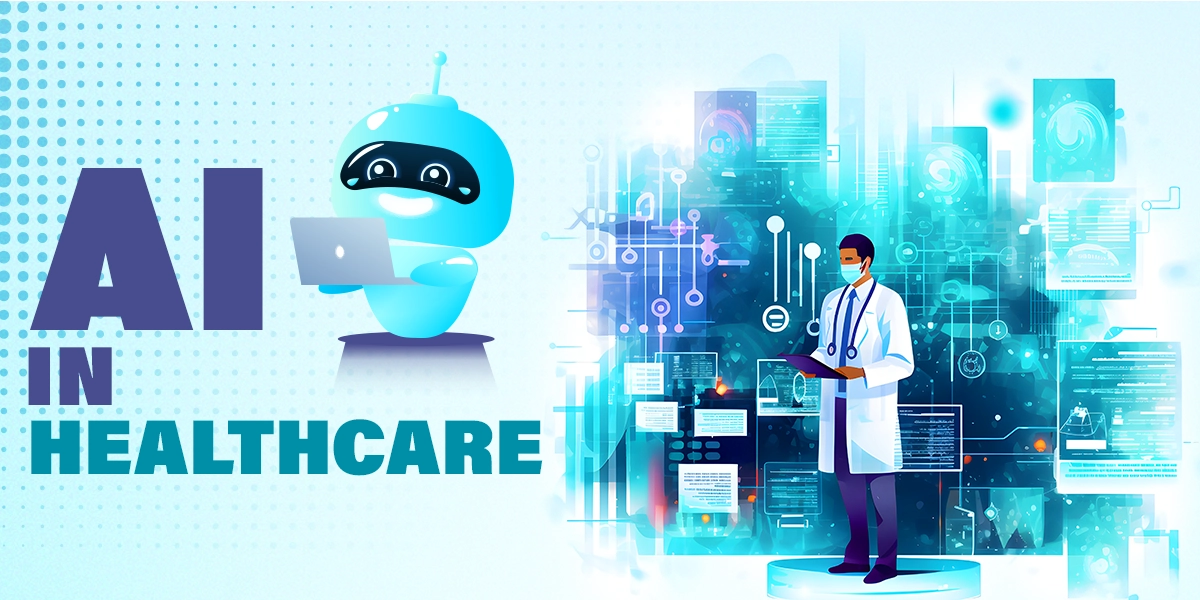Introduction
Artificial Intelligence has rooted its presence in the healthcare industry by extensively revamping user treatment and health monitoring norms. AI delivers more personalized medical care by recognizing the diagnosed data of the users at a quicker pace for hastening business efficiency for healthcare institutes. The laser-focused nature of the AI has the advanced ability to identify the root cause for any ailments, and its measures to counter attack that might have gone unheeded by general practitioners (GP).

- 60% of Americans find it unsettling that healthcare experts are using AI.
- 70% of the expenses invested in finding new medications can be reduced using AI.
- AI models can predict the survival of cancer patients 80% of the time.
- 65% of US adults wish to opt for AI for their cancer screening.
Implementing AI in medical institutes and other leading clinics can level up the functioning of healthcare for providing high-quality, reliable user care for billions of population residing across the country. The healthcare experts have predicted and acknowledged that AI will be the modern face of advancement in the healthcare industry. It will dictate the terms for the effectiveness of the user treatment, vital diagnosis, and overall furtherance in the upcoming medical technology.
The Eminence of AI in Healthcare Industry
AI is developing from its embryonic stage that still requires various technical elements infusion for its further refinement to metamorphose healthcare. Let us comprehend the importance of AI in healthcare and how it has relieved the workload of practitioners and medical residents:
1) Operating the Routine Diagnosis
Users’ data density has spiked up due to the elevation of AI. Inclusion of AI in healthcare can streamline compound tasks such as performing X-rays and scanning. The other laborious tasks, including cardiology and radiology, have been strategically put directly under the operation expertise of AI for controlling the data pinnacle.
75.7% of the radiologists reckon that AI-based algorithmic outcomes were accurate.
2) Delivering Medical Consultations Virtually
Medical treatment can be delivered remotely using AI. Babylon, is a perfect example of an AI-integrated healthcare app that comprehends the described symptoms of users and enables virtual consultations. This gets identified from the database of health ailments via speech recognition and helps the practitioners curate a medical plan for the user.
3) Administering Health Records of the Users
Data management of the users is a risky task; this can be streamlined with the amalgamation of integrated artificial intelligence (AI). High-functional bots are being operated for various administrative tasks, including monitoring users’ data, gathering, and segregating based on relevancy. This aids the healthcare experts to have free hands to obtain the desired information during the need of the hour.
4) Developing Treatment Procedures Blueprints
The evolution of AI was crafted mindfully, and in modern times, it is utilized to evaluate user’s medical data. This can be insightful for health professionals to assess and opt for personalized medication procedures. This enables the users to optimize the resources and attain a higher recovery environment.
5) Monitoring of the Health Specifics
Health monitoring is now made more accessible by including various fitness trackers such as Fitbit, Apple, and others. The AI-integrated fitness bands monitor your health count while performing any strenuous task and deliver accurate metrics to the users and their GPs.
Benefits of AI in Healthcare Industry
AI has plenty to offer to healthcare experts with its variety of technicalities. It is responsible for delivering superior user-centric services while being reliable. Let us have a glance at the benefits that AI delivers in the healthcare industry:
1) Well-balanced Workload on Staff
Every healthcare organization encounters an understaffing concern, which impacts the business productivity of the institute. Implementing AI can relieve the workload by operating with minimal expert inputs and delivering reliable results.
2) Cost-effective Nature
AI in healthcare setup can be economically efficient while operating on business administration. Healthcare institutes can eliminate medical errors that are proven to squeeze more time by employing AI using machine learning to perform tasks proficiently.
3) Meticulous Diagnosis of Ailments
With a higher user data analysis compared to manual experts, AI can deliver diagnostic results extensively faster. This can eventually result in a higher business workflow as the healthcare experts can rampantly speed up their performance while making last-minute complicated decisions.
4) Data Accuracy on a Real-time Basis
GPs and other experts must have access to the most reliable diagnosis data to operate with health concerns. AI backs the practitioners by delivering concrete data reports of the diagnosis while assisting them in crunch time.
5) Quality Patient Care
AI is utilized optimally to nurture the healthcare of the users effectively. This can be drawn to reality as AI delivers high-quality, reliable resources that reduce redundancies and identify users’ pain points. The fusion of AI in healthcare can boost the accurate confidence of health experts while considering treatment options for emerging ailments.
AI-powered Devices Used in Healthcare Industry:
Exploring the potential of AI is a hot topic taking rounds in the healthcare industry. The tech industry is forging its plans to deliver robust health monitoring applications and tools. Let us find out more about these AI-infused devices:
1) ECG Devices
Integration of AI in ECG devices is prone to deliver data on the user’s cardiac conditions, indicating symptoms of arrhythmias and much more. It is responsible for displaying the most accurate reports and sharing real-time updates.
2) Wearable Health Devices
Activity monitoring bands, Whoop, and smartwatches that are AI-embedded can monitor the vital stats of the users, including skin temperature, heart rate variability, and respiratory rate. They can indicate any even fluctuation in the health flow performance.
3) Telemedicine Channels
The healthcare industry has been engraved with virtual bots that are in sync with AI. These chatbots have made their way to assist users while looking after their private medical data, helping them book and manage their medical appointments and the dosage counts of the prescribed medications.
4) Remote Monitoring Devices
Healthcare experts are encouraging users to opt for AI-entrenched devices that can supervise the medical conditions of the users, including heart diseases, hypertension, BP fluctuations, and more. Accurate reports can help the users and GPs identify elements that must be controlled.
5) Robotic Surgical Tools
A blend of AI in healthcare has pushed the testing boundaries for healthcare experts to make use of robotic surgery techniques. Surgeons can now efficiently perform complicated and intricate surgeries using the Da Vinci Surgical tech tools and more to obtain a higher success rate.
AI-Challenges Witnessed in the Healthcare Industry
Despite the remarkable development of AI, there is ample room for improvement to acquire the complete reliability of healthcare decision-makers. We will find out what they are:
1) Data Security and Information Breach
AI requires a surplus amount of data volume to store in its application, which triggers the concern of the confidentiality and safety standard adherence of users’ data. The healthcare experts using AI must provide a practical understanding of how the user data sets would be utilized and its preventive measures to safeguard it from any illegal malpractice.
2) Inadequate Tech Awareness
Research progress can be hampered due to users’ ignorance of the rise in the demand for AI in healthcare. Insignificant awareness regarding the technology can result in hesitation to continue using these tools. This might drain the potential of the AI to run various advanced diagnoses on users, constraining its maximum deliverance.
3) Miscalculated Data Reports
Implementing AI in the healthcare industry is susceptible in terminating human-committed errors. The entirety cannot be loaded as it is unreliable in given areas. Larger datasets can draw in higher error percentages, which might create uneven understanding patterns for the GPs when prescribing medications to users.
4) Unfairness of Users’ Data Accumulation
During the development of AI, it is vital to instill datasets of broad population groups rather than an illustrative set of numbers. This can result in biases during the accumulation of user data during the diagnosis, resulting in fatal repercussions.
5) Regulatory Compliance
The software application of AI has not yet been regulated by any government official organizations. This can establish anxiety among the users for things to expect while interacting with AI. Healthcare institutes without any regulation might not be aware of the set usage limit of AI for their users.
Future Trends of AI in Healthcare Industry:
AI, with the latest inventions and advancements in technology, has the potential to unleash impossible achievements. The medical industry can levitate and use AI in elegant methods to provide the utmost users’ care. Here’s a list of trends to watch out that can change the entirety of the healthcare industry:
1) Advancement in Drug Discovery
The modern advancements in AI have aided researchers and healthcare experts in identifying solid and advanced drugs based on emerging challenges and crises. Healthcare experts, along with researchers, reckon that AI has the potential to restructure the development process of drugs. It can perform tasks at a fraction of the time and cost during unmet medical conditions for vaccines and other unidentified disorders.
2) Applicable Medication Prescriptions
Personalized treatment can now be delivered at a faster rate using AI. With the advancement of AI, the extraction of users’ data, comprehension of medical history, and other relevant information can be extracted in real-time. It can graph suitable medication procedures that practitioners and medical residents can share with users.
3) Laser Sharp Image Processing Diagnosis
AI has leveled up the game by covering all the ailments in a single diagnosis using Convolutional neural networks and deep learning. It is now equipped to accurately perform X-rays, MRI accurately, and other CT scans with higher pixel resolution. With faster identification of ailments, AI can increase work efficiency to deliver earlier medications to users.
3) User-centric Care with AI-aligned RPA Solutions
The execution of Robotic Process Automation with AI delivers acute user care. This involves rule-based processes that can fast-track the healthcare business output. It performs and monitors data entries, scheduling appointments, and more that can be proven to be optimal for enhancing productivity.
4) Business Workflow Enhancer
AI provides a free hand for the GPs and other practitioners, allowing them to focus thoroughly on intricate, complex tasks. In contrast, the AI has been trained to operate on simple, routine tasks, including data accumulation, confidential paperwork, and other chores to share the workload with healthcare executives, driving higher workflow efficiency.
Final Words
Despite the advantages and challenges of AI in healthcare, growth is a constant aspect that is been worked on. AI and its algorithms are implemented by medical institutes smartly. A good assortment of Human touch with AI-backed support can fuel the industry’s operating method to achieve heightened business results. Businesses that are aiming to expand their industry reach in the medical sector can reasonably opt for a healthcare database to market their products/services, which can result in overall growth in the healthcare industry with a fusion of AI.





